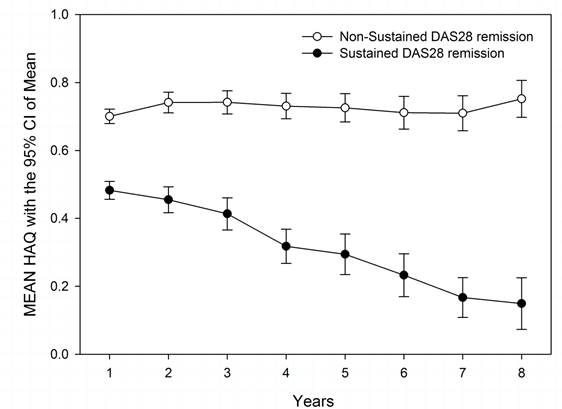Session Information
Session Type: Abstract Submissions (ACR)
Sustained Remission Improves Physical Function In RA Patients Treated with Tumor Necrosis Factor Inhibitors
Background/Purpose
Remission is increasingly becoming a treatment goal in rheumatoid arthritis (RA) patients. Despite their limitations DAS28 remission criteria are widely used. It is not clear whether achieving remission is sufficient or weather the goal should be sustained remission. Physical function measured by health assessment questionnaire (HAQ) is a major outcome in RA. HAQ is shown to be one of the strongest predictors of long-term outcomes including quality of life, work disability and mortality.
The purpose of this study was to investigate the physical function over a long time period in RA patients treated with Tumor Necrosis Factor inhibitors (aTNF) who achieved sustained remission (SR) compared to that of patients occasionally achieving remission (non-sustained remission, nonSR).
Methods
Anti-TNF treated RA patients included in the observational South Swedish Arthritis Group register were eligible for this study. We identified patients with DAS28<2.6 at some point and those that achieved sustained remission in consecutive visits for at least 6 months. The course of functional status was assessed using HAQ at each visit.
Results
Of 2416 patients included, 1194 (49.4%) reached DAS28 remission at some point. Of those fulfilled 382 (15.8 %) the criteria for SR with median duration of 5.25 years while 812 (33.6%) had non-sustained remission. The nonSR group had mean disease duration of 11.5 years at treatment start compared to 10.1 years in the SR group, and mean HAQ of 1.3 compared to 1.0 in the SR group. Figure1 show the mean HAQ in each year after remission start with the 95% confidence interval of mean. In the first year the mean HAQ in the SR group was 0.48(95%CI of mean 0.026) and then continued to improve in every year for 7 years. The HAQ is significantly lower in year 4 (0.32; 95%CI 0.050) and again in year 7 compared to year 4 (0.167; 95%CI 0.058). In the nonSR group the mean HAQ in the first year was 0.701 and did not change significantly over 8 years.
Conclusion
Physical function measured by HAQ improves in patients with established RA reaching sustained remission and continues to improve while in remission. This suggests that treatment should be aimed at maintaining sustained remission.
Disclosure:
J. T. Einarsson,
None;
M. C. Kapetanovic,
None;
P. Geborek,
None.
« Back to 2014 ACR/ARHP Annual Meeting
ACR Meeting Abstracts - https://acrabstracts.org/abstract/sustained-remission-improves-physical-function-in-ra-patients-treated-with-tumor-necrosis-factor-inhibitor/

